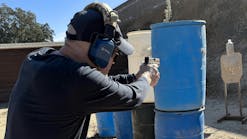FLAGSTAFF, Ariz. --
A year after a federal law gave American Indian tribes more authority to combat crime on reservations, few have taken the steps to enact one of its main provisions - a measure allowing tribes to triple the amount of time tribal members can spend in jail.
The increase in sentencing authority from one year to three years for a single crime under the Tribal Law and Order Act marked one of the most substantial changes for tribal criminal justice systems. But sending people to jail for longer periods means that tribes first must provide public defenders, establish or update criminal codes, and have law-trained judges.
Some have determined they can't afford it or are content with their current systems that don't always determine a winner and loser and focus on restorative justice, while others are reserving the authority for only the most serious crimes.
"Tribes are cautiously proceeding, and rightly so," said Troy Eid, chairman of the Indian Law and Order Commission born out of the act. "If they get it wrong, that's a violation of the defendant's constitutional rights, and that would potentially invalidate the whole program."
President Barack Obama signed the measure into law last July, saying it was an important step in addressing the unique public safety challenges that confront reservations. The measure resulted in the appointment of special U.S. attorneys to ensure violent crimes are prosecuted. It also revamped training for reservation police and aims to improve the collection of reporting of Indian crime data.
U.S. Department of Justice officials highlighted the efforts they've made in Indian Country in a call with reporters Tuesday. They said they've traveled to sometimes remote areas to hear from tribal leaders on how they can better collaborate to combat crime. U.S. attorneys in South Dakota, Arizona and New Mexico spoke about how their offices have trained tribal police as federal agents, recruited tribal prosecutors to assist in federal cases, helped improve technology in tribal court systems and are working to make sure that major crimes on reservations don't go unpunished.
According to the federal government, violent crime rates on Indian reservations are more than twice the national rate, and there is an epidemic of domestic and sexual violence in Indian Country, along with high instances of child abuse, teen suicide and substance abuse. Federal officials have also said there is a proliferation of gang activity on reservations, and yet law enforcement recruitment and retention across Indian Country lag far behind the rest of the nation.
"We know that the issues of public safety in Indian Country are daunting and sobering," said Arizona U.S. Attorney Dennis Burke. "We know we've had a lot of successes, and we have a ways to go."
On the Tulalip Reservation in Washington, tribal officials are preparing to present a proposal to the legislative body next month that would create a new class of 15 felony crimes that include rape and sexual assault of a minor, and are punishable by up to three years in jail, said Chief Judge Theresa Pouley. In the last six months, three sexual assault cases have been filed in tribal court, she said.
"Tulalip wants to maintain that restorative justice code at the same time balance the extended jurisdiction to address really serious crimes," she said.
Pouley, who also trains tribes on the provisions of the Tribal Law and Order Act, said extending sentences could stretch already scarce financial and personnel resources for some tribal governments, which must then figure out how to house the inmates. The Tulalip Tribes contract with a neighboring county to house anyone sentenced through the tribal court system.
On the Navajo Nation - the country's largest Indian reservation, extending into New Mexico, Utah and Arizona - officials have not actively talking about lengthening sentences. Any discussion would delve into exactly what Congress intended with the language in the Tribal Law and Order Act, whether the federal government's idea of due process, fairness and law-trained judges fits the definition that Navajo officials might have, and, foremost, tribal sovereignty, said Chief Justice Herb Yazzie.
"Navajo people, because they are a sovereign nation, will not simply accept wholesale the demands of another government," he said. "Because reality is that we want to institute and offer a system that administers Dine justice, not some other government's sense of justice. When you do that, you also have to realize that we still need these systems of the federal government and financing (for) some of these improvements. So it's a delicate arrangement that we will have to reach."
The Navajo court system is guided by restorative, rather than punitive justice. It includes peacemaking courts and uses a set of centuries-old traditional tribal laws that all tribal judges must know in deciding cases.
John Dossett, general counsel for the National Congress of American Indians, said tribes have relayed stories to the organization that an enhanced sentence is a good tool for plea bargains and sometimes serves to deter people from committing crimes. But for tribes that are served by outside law enforcement and have no justice system of their own, creating them might be the biggest hurdle.
"There are so many aspects to this, that's why it takes more time to implement," he said. "The problem isn't solved yet, but there is forward motion. Tribes are very interested in continuing to work with the administration and Congress, partly because they're seeing some successes.
___
Felicia Fonseca can be reached at http://twitter.com/FonsecaAP



